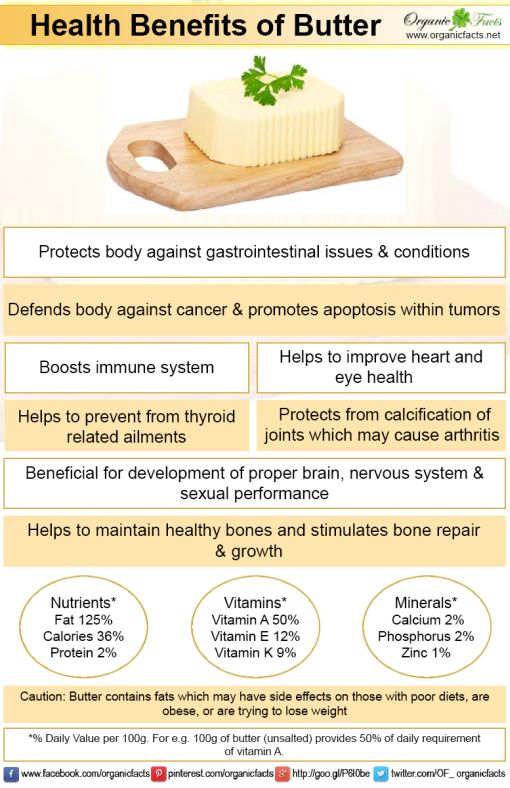Although butter has had fluctuations in reputation over the years, it is actually a very beneficial part of a person’s diet that can improve your immune system, regulate our hormones, protect our vision, boost metabolism, increase brain function, reduce chances of heart disease and blood pressure, and protect you from cancer. Furthermore, butter can protect against gastrointestinal conditions, while ensuring proper development of brain and nervous system development.
By definition, butter is a dairy product that forms when milk or cream is churned, either from a fermented or a fresh source. This physical manipulation of the liquid changes it from an oil-in-water emulsion to a water-in-oil emulsion, because the membranes of fats are broken down and they join together to increase thickness and create the consistency that butter requires. When this chunkier, thicker emulsion if put in the refrigerator, the different variations of fat begin to solidify and mix, resulting in the apparent solid of butter, which softens at room temperature to the spreadable dairy product we all know and love. Butter is traditionally derived from animal milks, most commonly cows, so butter, as with most dairy products, is is produced mainly in areas with cows. However, other kinds of butter can also be derived from the milk animals like sheep, buffalo, goats, and yaks.
There is evidence that butter has been used in various cultural cuisines for more than 4,000 years, and in-depth studies of Indian culture as well as the Bible tell us that butter has been around for millennia, has long been considered sacred, and has long been respected for its nutritious potential. However, in recent decades, a shift in opinion has given butter something of a bad name, and people are turning towards margarine, or other overly processed and chemically altered substitutes, rather than butter. Now only is this decreasing the amount of organic food that is in the diet, but also eliminating all of the health benefits that butter can bring to your life.
 Nutritional value of butter
Nutritional value of butter
These positive qualities of butter are mainly due to the impressive amounts of vitamins and minerals that are found in butter. This includes vitamin A, D, E, and K, as well as essential minerals like manganese, chromium, iodine, zinc, copper and selenium. This is only a partial list of the most notable and important benefits, but with the wide array of nutrients in butter, more potential benefits are being discovered all the time. Butter is mainly composed of fats, not all of which are harmful, and many of which are essential to human health!
Health Benefits of Butter
Powerful antioxidant: Natural butter contains high levels of carotene, an unusual and essential nutrient for human beings. Carotene contributes to human health in two ways, either turning into antioxidants, or converting into vitamin A. In terms of antioxidants, about 60% of carotene taken in by the body is changed into these disease-fighting compounds in the body. These antioxidants are anti-infectious and can provide a boost to your immune system. Since vitamin A is fat-soluble, it can benefit those parts of the body that have fat-soluble membranes, like the skin, eyes, mouth, throat, as well as the urinary and digestive tracts. There, it can promote cell regrowth and repair, protecting it from vulnerability to infectious substances.
Furthermore, vitamin A boosts the immune system by stimulating the production of lymphocytes, the immune system’s defensive cells that protect against viruses and various diseases. High levels of vitamin A can improve your defenses against respiratory infections, as well as autoimmune diseases like AIDS.
Anti-Cancer properties: High levels of vitamin A and beta-carotene have also been widely studied, and positive connections between these two nutrients and lower chances of colorectal and prostate cancer have been found. More research is still being done on vitamin A’s impact on breast cancer, but studies so far have been promising. Some of this benefit comes from the antioxidant capabilities of vitamin A, because they actively defend against cancerous growth and promote apoptosis (spontaneous cell death) within tumors, slowing down the metastasis of cancerous cells.
Conjugated Linoleic Acid (CLA) has also been found in significant levels in butter, and has been connected in studies as a cancer prevention method. All in all, butter, when consumed in moderate quantities, can reduce your chances of developing cancer! However, vitamin A in high amounts when combined with smoking has been shown to increase the chances of lung cancer, so smokers should turn towards vitamin-C for their antioxidant needs, rather than vitamin A.
Intestinal conditions: Among the many components of butter, it also contains glycospingolipids. This special type of fatty acid can protect your body against a number of gastrointestinal issues and conditions, by contributing to the mucus layers along the membrane and making it more difficult for bacterial infections to bind to functioning receptors. Butter has a high level of glycosphinglolipids within it, primarily because it is derived from another animal, so adding butter to your diet can increase your defenses in your stomach and digestive tracts.
Cardiovascular health: Many people are shocked to hear that natural butter can actually work to improve the health of your heart, rather than reduce it! Butter contains HDL cholesterol, also considered “good” cholesterol. This omega-3 fatty acid actually reduces the presence of omega-6 fatty acid (“bad” cholesterol) which can clog up arteries and lead to atherosclerosis, heart attack, and stroke. However, the reason that butter gets a bad name is because of having both types of cholesterol. That being said, organic butter does have good cholesterol, and also higher levels of good cholesterol than what is found in processed butter and margarine.
Thyroid health: Our thyroid gland is arguably the most important part of our endocrine system, and one of the essential relationships that it has is with vitamin A. Most people that have hypothyroidism or other thyroid related diseases are also deficient in vitamin-A. This helps the proper functioning and regulating of hormones to be created and secreted throughout the body. Butter has more vitamin-A than any other type of vitamin, so if you have thyroid issues, or want to prevent them from occurring, be sure to include butter in moderate amounts in your diet.
Sexual dysfunction: Many of the fat soluble vitamins that can be found in butter are essential to human health, because they are necessary to take nutrients out of water-soluble vitamins.. Studies have shown that many of these fat-soluble vitamins can even improve sexual performance. Both vitamin A and D are important for proper brain and nervous system developments, but they are also needed for sexual development. Without those fats, as well as vitamin E, all men and women can experience a type of nutritional sterility, where their sexual characteristics don’t appear properly. It is no surprise that rates of sexual dysfunction and sterility have increased dramatically in the recent decades since butter consumption has declined. Butterfat is the best source of fat-soluble vitamins we have, yet many people are completely losing that part of their nutritive intake.
Eye health: Beta carotene, which is found in such high levels in butter, has long been known as a booster for eye health. It contributes to the protection of the eyes, as well as in stimulating additional cellular growth, retarding the onset of cataracts, and reducing the chances of macular degeneration. It also decreases the risk of angina pectoris and other eye-related conditions.
 Arthritis and joints: Butter contains a rare hormone-like substance that can only be found in butter and cream. It is called the Wulzen Factor, and it protects people from calcification of the joints,which leads to arthritis. This same factor can also protect humans from hardening of the arteries, calcification of the pineal gland, and as mentioned above, cataracts. This is only found in animal fats like cream or milk, but pasteurization eliminates the Wulzen Factor, so butter substitutes and margarine lose that vital benefit. Studies have shown that baby calves that are given substitute formula without the Wulzen factor do not survive, until it is replaced with organic butterfat.
Arthritis and joints: Butter contains a rare hormone-like substance that can only be found in butter and cream. It is called the Wulzen Factor, and it protects people from calcification of the joints,which leads to arthritis. This same factor can also protect humans from hardening of the arteries, calcification of the pineal gland, and as mentioned above, cataracts. This is only found in animal fats like cream or milk, but pasteurization eliminates the Wulzen Factor, so butter substitutes and margarine lose that vital benefit. Studies have shown that baby calves that are given substitute formula without the Wulzen factor do not survive, until it is replaced with organic butterfat.
Bone health: Aside from the anti-stiffness factor explained above, butter is also rich in essential minerals, like manganese, zinc, copper, and selenium. These are all important elements inmaintaining bone health, and stimulating bone repair and regrowth. Without a steady intake of these minerals, both essential and trace, you will develop osteoporosis, arthritis, and will suffer from other symptoms of premature aging.
Some of those minerals, like selenium and manganese, also have other functions. Selenium is integral to proper thyroid and immune system function, while manganese is necessary to create blood, just like iron, though in smaller quantities.
Nutritional absorption: As if all of these benefits are not good enough, butter also gives us something called Activator X, a mysterious vitamin and catalyst found in animals with specific diets, like grazing cows. It has an amazing ability to increase the efficiency of the body when taking in nutrients from food sources, making the most use out of every nutrient that passes through our systems. Chalk up another victory for butter!
A Few Words of Caution
Despite the health benefits of butter, it is important not to forget that it is still composed mainly of fats, which can wreak havoc on certain people, particularly those with poor diets, are obese, or are trying to lose weight. Butter does contain unhealthy cholesterol, and if too much is consumed, it can lead to many health problems, like heart disease, cancer, obesity, and all the other related health conditions that accompany those. All good things should be taken in moderation, and never above the required amounts. Consult your doctor to get a reading on your overall cholesterol health and risk of heart disease before switching back to butter for its other health benefits.
''An apple a day keeps the doctor away''
















0 comments:
Post a Comment